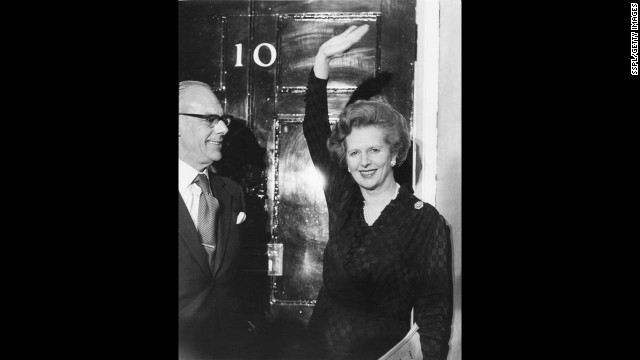We Join Others In Mourning The Passing Of Britain's "Iron Lady", Margaret Thatcher. RIP.
Margaret Thatcher, Who Remade Britain, Dies at 87
“It is with great sadness that Mark and Carol Thatcher announced that
their mother, Baroness Thatcher, died peacefully following a stroke this
morning,” a statement from her spokesman, Tim Bell, said. She had been
in poor health for months, and suffered from dementia.
Mrs. Thatcher was the first woman to become prime minister of Britain and the first to lead a major Western power in modern times. Hard-driving and hardheaded, she led her Conservative Party to three straight election victories and held office for 11 years — May 1979 to November 1990 — longer than any other British politician in the 20th century.
Queen Elizabeth IIand Prime Minister David Cameronoffered tributes to
what Mr. Cameron called “a great leader, a great prime minister, a great
Briton.” Mr. Cameron cut short a visit to Continental Europe to return
to Britain.
Buckingham Palace said the queen was “sad to hear the news” and would be sending a private message of sympathy to the family.
A statement from the White House said that “the world has lost one of
the great champions of freedom and liberty, and America has lost a true
friend.”
The tough economic medicine Mrs. Thatcher administered to a country
sickened by inflation, budget deficits and industrial unrest brought her
wide swings in popularity, culminating with a revolt among her own
cabinet ministers in her final year and her shout of “No! No! No!” in
the House of Commons to any further integration with Europe.
But by the time she left office, the principles known as Thatcherism — the belief that economic freedom and individual liberty are interdependent, that personal responsibility and hard work are the only ways to national prosperity, and that the free-market democracies must stand firm against aggression — had won many disciples. Even some of her strongest critics accorded her a grudging respect.
At home, Mrs. Thatcher’s political successes were decisive. She broke the power of the labor unions and forced the Labour Party to abandon its commitment to nationalized industry, redefine the role of the welfare state and accept the importance of the free market.
Abroad, she won new esteem for a country that had been in decline since
its costly victory in World War II. After leaving office, she was
honored as Baroness Thatcher of Kesteven. But during her first years in
power, even many Tories feared that her election might prove a terrible
mistake.
In October 1980, 17 months into her first term, Mrs. Thatcher faced disaster. More businesses were failing and more people were out of work than at any time since the Great Depression. Racial and class tensions smoldered so ominously that even close advisers worried that her push to stanch inflation, sell off nationalized industry and deregulate the economy was devastating the poor, undermining the middle class and courting chaos.
At the Conservative Party conference that month, the moderates grumbled that they were being led by a free-market ideologue oblivious to life on the street and the exigencies of realpolitik. With electoral defeat staring them in the face, cabinet members warned, now was surely a time for compromise.
To Mrs. Thatcher, they could not be more wrong. “I am not a consensus
politician,” she had often declared. “I am a conviction politician.”
In an address to the party, she played on the title of Christopher Fry’s popular play “The Lady’s Not for Burning” in insisting that she would press forward with her policies. “Turn if you like,” she told the faltering assembly. “The lady’s not for turning.”
Labels: Fitting tribute, Passing away





0 Comments:
Post a Comment
<< Home